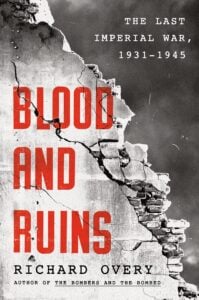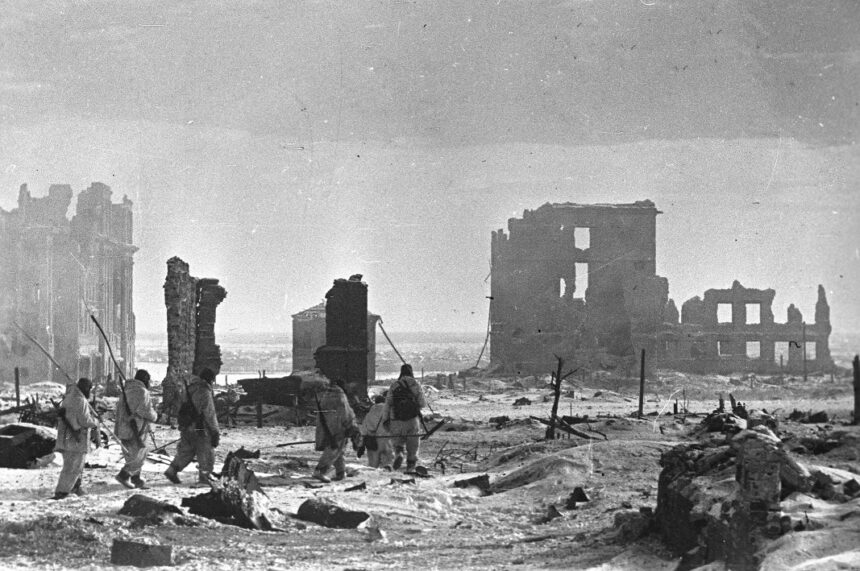
Blood and Ruins: The Last Imperial War, 1931-1945
by Richard Overy
Viking
1040 pp., $42.00
Richard Overy is a major historian and above all a renowned expert on the Second World War. Blood and Ruins may not be his best work, but, despite some faults, it is the best general account of the war since Gerhard Weinberg’s A World at Arms. Both books bring out points that may surprise even fellow specialists.
When Overy sticks to the war itself, he does his usual excellent job, concentrating on the most important developments with just the right amount of detail—sometimes unusual and valuable detail. He is extremely good at describing and explaining the German victories in the West in 1940. He counters, correctly, the recently fashionable view, propounded most notably by Karl-Heinz Frieser in his Blitzkrieg Legend, that the German victory in France was almost a fluke and not due to any basic German superiority in techniques or equipment, save perhaps in the air.
Too much has been made of the point that the Allies had as many tanks as the Germans and that the French tanks were as well-armed and better armored; conversely, insufficient attention has been paid to the fact that their crews were poorly trained, that their tanks usually lacked radios, and that they were designed such that one man was saddled with the impossible job of commanding the tank and operating the turret cannon.
Overy covers the Battle of Britain, the planning and failures of the German campaigns in Russia, the Axis failures in the Mediterranean, deception measures, war production, Lend-Lease aid to Britain and the USSR, and the strategic bombing campaigns against Germany and Japan. At this last, as might be expected of a leading authority on the air war, Overy is quite good, clearly explaining the successful attacks on Germany’s oil industry and transportation infrastructure, with obvious distaste for the area attacks on cities. Those may have been unavoidable early on, but by the spring of 1944, more effective and humane courses were possible.
It is puzzling, then, that at one point, Overy obscures this fact by remarking that distinguishing between specific industrial and transportation targets “made little difference to those being bombed.” While bombing in World War II was rarely very accurate—even the most careful and successful “precision” attacks usually hit something as well as the intended targets—the toll of lives taken by attacks on industrial plants and transportation was not nearly as bad as that in the area attacks aimed at burning out the centers of German (and Japanese) cities.
Occasionally Overy is less sure about some usually minor points. His references to Churchill and Roosevelt and their relationship suggest that he swallows the line laid out by David Reynolds in his useful but flawed Creation of the Anglo-American Alliance, which, in my view, managed to be unfair to both men.
I am not sure, either, that Overy is right—although he shares the conventional judgement here—that Hitler’s decision to declare war on the U.S. was a fatal mistake. It was a mistake, yes, but its worst consequence may only have been to make President Roosevelt’s life a bit simpler. Given the undeclared war in the Atlantic, Hitler had good reason to think that an all-out war was near and that he might please the Japanese by taking the plunge when he did.
In explaining the extent of spontaneous atrocities during the war—rather than ones deliberately planned—Overy places undue emphasis on the stresses of war and its brutalizing effect. But the stress was just as great in the First World War, perhaps more so, as people were less mentally prepared for the horrors of war in 1914 than in 1939. Yet mass misbehavior was far less than in the Second World War, as noted by many people, including Churchill. There seems to be a great reluctance to go deep enough to find the real explanation for this fact. Or perhaps the explanation is not that difficult after all. It might just be that, as George Orwell once commented, the people of the Victorian Age, whatever their limitations, were basically more decent than their successors. But, of course, many cannot admit such a thing.
In addressing the readiness to take part in the planned atrocities, Overy agrees with Christopher Browning’s “ordinary men” thesis, that the mass killers of the Ordnung police battalions in the occupied USSR were not really very different from other people. Browning played down the extent to which they were Nazi “true believers,” carefully indoctrinated before taking up their tasks.
In Overy’s treatment of the war with Japan, there may be a touch of moral equivalence. To be sure, he goes into the grim details of Japanese behavior in China and Southeast Asia. But he does seem to overstress the role of racist sentiments on both sides—à la M.I.T. historian John Dower—even though those sentiments were probably less serious than in the struggle in Eastern Europe. Had the Japanese been “white” but behaved the way they did, they would have been hated about as much. (It is worth noting that Indian soldiers loathed Japanese as much as American, Australian, and British servicemen.) The Japanese did not treat—probably could not have treated—Westerners worse than their Asian victims, who must have outnumbered the Western ones by at least a hundred to one. Indeed, a certain type of Japanese—Japanese were no more uniform in their attitudes than anyone else—found Westerners worthier of respect than the “mere natives” of Southeast Asia.
Overy’s sensitivity on this point is not unconnected with the framework into which he forces the war, and it is here that we find a persistent weakness in Blood and Ruins: an obsession with imperialism—mainly, although not only, Western European imperialism. Overy seems to be one of those suffering from a bad conscience over the exaggerated misdeeds of the overseas empires, though he does show awareness that, as empires go, they were not that bad. For Overy, this war and the First World War were products of imperialism, especially the “new imperialism” of the 19th century, and the Axis powers were seeking to replicate—in a worse form, of course—the older empires.
But imperialism did not cause the First World War. Conflicts involving overseas matters were always subjected to compromise. That war was a product of intra-European conflicts between rival alliances and was not deliberately started for gain by either side, whereas the ideologically based programs of the Axis (and Soviets) in the Second World War led to confrontation between very different societies in a very different world.
It is hard to relate Overy’s obsessions (which, to be sure, are widely shared) to the reality of the Western empires. He exaggerates British dependence on their empire, the profits gained therefrom, and willingness to hang on to it at all costs. He barely notes the concessions made to Indian self-government in the 1930s. For example, the nationalist Congress Party already ran part of India before the Second World War. One would hardly realize, reading Overy, that one of the two major British political parties had long been anti-imperialist or that, as historian Bernard Porter has noted, a 1939 British opinion poll showed 77 percent of the population favored giving India independence within a few years.
Overy writes that the Allies, in justifying the war, faced
the awkward double standard in the constant repetition that the two allies, together with the British white Dominions, were defending democratic values, when they both controlled large colonial empires in which they had little intention of initiating those values.
Aside from the obvious point that if the Allies lost, their colonial subjects would not gain, defenders of holding onto the empire could argue, in good conscience, that many or most of the colonial peoples were not yet able to run their affairs successfully—some of course would have denied they ever could—and if cut loose, were not going to do so democratically, or even humanely. The last three-quarters of a century have shown rather clearly that the real source of violence in many places was not Western rule but conflicts between local communities—sometimes, as in the Indian subcontinent, even between genuinely democratic governments with the best of intentions.
It is hard not to suspect that the recent tendency to flog the dead horse of the Western empires with increasing ferocity is a way to avoid dealing with just how badly a substantial number of ex-colonies have failed. It also raises questions about the wisdom of those who scuttled colonial rule overnight, particularly in Africa, with little preparation for independence.
Overy spends no less than 50 pages discussing the consequences and aftermath of the war, but practically all of those pages are on decolonization. Surprisingly, he almost entirely ignores the occupation of the Axis powers, post-war reconstruction, and, save where it impinges on decolonization, the Cold War (though he never presents the Soviet state as anything other than a monstrous tyranny)!
Despite the tiresome woke influence on the topic of imperialism, Overy remains an extremely capable historian and has produced a book well worth reading.



Leave a Reply